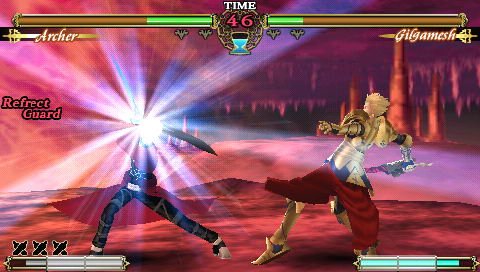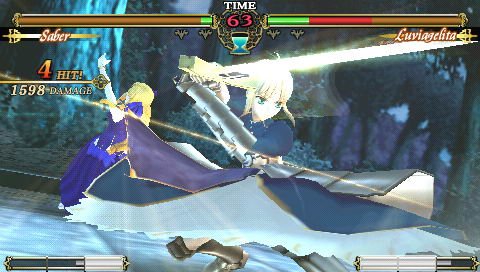Most Western audiences are unfamiliar with the manga, anime, and interactive visual novels of the Fate universe, which deal with a struggle between powerful magicians and warriors for the Holy Grail. Despite this unfamiliarity, Capcom has made its Japanese arcade and PlayStation 2 fighter Fate/Unlimited Codes available for the PSP via the PlayStation Network. And because the language of punching, kicking, and performing insanely special moves is universal, anyone who's ever played a fighting game will feel immediately at home with it. It's not going to set the world of fighting games on fire, but Unlimited Codes is a fun fighter that stands on its own.

Unlimited Codes assumes that players have knowledge of the characters and events in the Fate stories. Those who come to the game without this background knowledge will find it difficult to piece together any real sense of the characters, what each one is fighting for, and their relationships to each other. Of course, an understanding of the plot is hardly crucial to the enjoyment of a fighting game like this one, but nonetheless, it could have served as a better introduction to the universe. As it is, the dull story sequences, which include a lot of mystifying references to ancient orders, schools of magic, and events unseen, are more likely to frustrate players than draw them into the story.
The mode you'll probably spend the most time with is the Arcade mode, in which you select one of 14 characters (an additional three can also be unlocked) and fight through a series of eight matches. These one-on-one fights take place in 3D environments, but while you can dodge enemy attacks with a side step, the action otherwise takes place on a 2D plane. There's a reasonable amount of depth to the fighting system. Strangely, though, you'll need to ratchet up the difficulty to the highest possible option before any of this depth starts to matter. On any other level, the AI is terribly passive, which makes it all too easy to spam your way to victory by using the same attacks over and over again. The AI doesn't even move around or fight back enough to make this interesting in a pure button-mashing sense. It's just dull. This is resolved easily enough by simply setting the difficulty to hard, but a broader range of difficulty levels that offered engaging combat would have made for a stronger package.
With the difficulty set to hard, though, your opponents finally start to show a bit of fighting spirit. It's at this point that Unlimited Codes begins to reveal itself as a competent fighter, in which dramatic turns in the tide of battle are frequent and victory is never assured. This is largely because of a mechanic called the Holy Grail Gauge, which is a shared meter that fills up as both characters suffer damage. Whichever character deals the blow that maxes out the gauge gets to reap the benefits of its power by performing his or her devastating Holy Grail burst supermove. This move is unique for each character, but it invariably looks as crazy and powerful as that name suggests. And, if executed successfully, it can easily snatch victory from the jaws of defeat. It's an exciting mechanic that keeps you engaged in bouts that might otherwise seem hopeless.
In addition to their spectacular Holy Grail burst supermoves, characters have standard light, medium, and heavy attacks, as well as a modest assortment of special moves. Finally, characters have a magic meter that fills up as they attack or defend, and once one of the meter's three segments is full, they can perform more powerful supermoves. Or they can trigger a magic burst that can knock back an opponent, recover life, and bestow other short-lived but often vital benefits. Thankfully, you won't spend any time fighting with the controls as you're trying to pull off any of this stuff. The controls are tight and responsive, and even the most powerful moves are easy to perform. And because most characters share inputs for many of their special moves, you won't need to spend a great deal of time learning how to pull off each character's techniques. Once you've got a handle on the fundamental moves for one character, you'll be well on your way to a solid grasp of each character. That's not to say that all the characters are similar. Far from it. The characters vary tremendously in movement speed, attack power, and range. It just spares you the need to keep 14 unique sets of move inputs straight in your head.

In addition to the Arcade mode, there's a Spectate mode where you can watch two computer-controlled fighters go at it. There's also a tutorial mode that takes you step-by-step through the game's concepts, from the most basic attacks to advanced techniques, such as move-canceling. The Practice mode gives you control of virtually every aspect of a match and lets you work on your skills to your heart's content. And the Mission mode sets up a series of challenges for each character that involves more straightforward tasks, from defeating an enemy with a specific move to more unusual ones, such as winning a match with the camera situated behind your character. Most significantly, Mission mode teaches you a number of effective combos that you can employ in combat. And there's an ad hoc two-player Versus mode that works very well. Like most fighters, Unlimited Codes is at its most exciting when played against human opponents, so those who know other people with the game will get more out of it.
Unlimited Codes looks pretty good. The characters animate gracefully, and their special moves look powerful and fill the screen with bursts of magical color. Enhancing the impact of some attacks are camera movements that give you a particularly good view of the action, swooping in low to emphasize a kick that sends a character flying or leaping into the air as a combatant swings his or her opponent in an arc before tossing him or her to the ground. The sound effects match the intensity of the visuals, with over-the-top voice acting befitting this epic struggle. (Alas, no English language track is provided, but the Japanese voices are more than capable of conveying the emotions behind the actions.) The electronic beats of the music are generic and don't command much attention, but the slap of landed blows, the clang of weaponry, the tinkle of distinctive chimes, and the whines of magic are all fitting.
Fate/Unlimited Codes strikes a good balance between accessibility and depth, with straightforward controls that most players will quickly grasp. It also has enough complexity available via combos and move-cancels to reward seasoned fighting game players. It's not remarkable enough to be a championship contender, and 30 bucks seems like a bit of a high price to pay for a port of a PS2 game, but if you're looking for a fun fighter to take with you on the go, Unlimited Codes will fit the bill nicely.